Keeping tropical fish involves more than just setting up a tank. A key part is knowing when to feed them. The right feeding schedule is crucial for their happiness and health. We’ll look at why it’s important, how to feed them well, and how it affects their well-being.
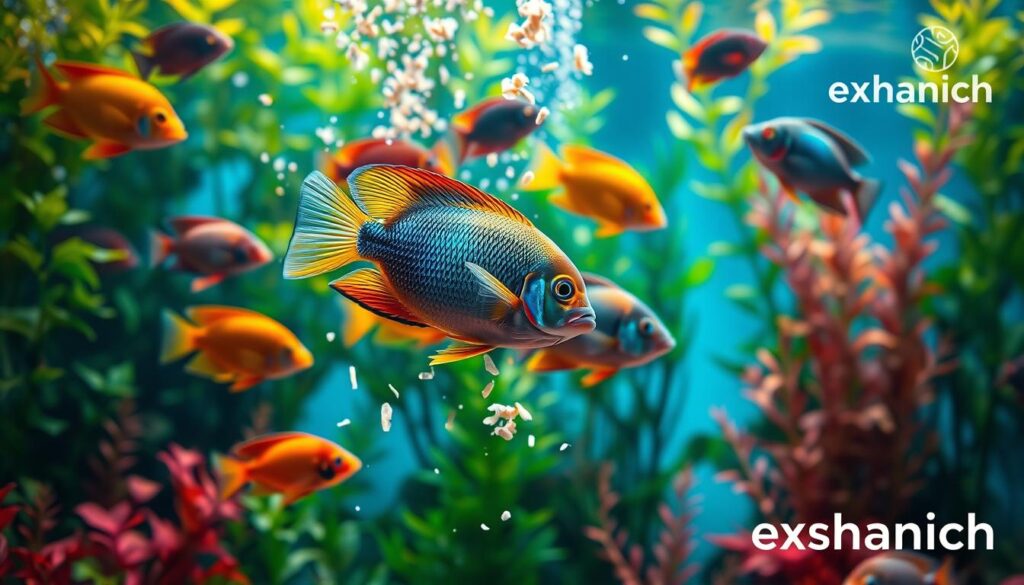
By following these tips, you can create a feeding plan that meets your fish’s needs.
The Importance of a Feeding Schedule
Having a good fish feeding schedule is key for keeping tropical fish healthy. It helps avoid overfeeding and underfeeding. This ensures your fish get the right amount of food without harming the water quality.
Setting a regular feeding time lowers stress in fish. Stress weakens their immune system, making them sick easier. Regular meals make fish feel safe and helps them grow well. It also keeps the water clean by preventing food from rotting.
Studies in fish farming show the value of a strict feeding schedule. Experts suggest feeding methods that match each fish’s natural diet. Knowing what your fish need helps them stay healthy and avoids problems from irregular feeding.
| Feeding Schedule Benefits | Fish Health Impacts |
|---|---|
| Reduces stress | Stronger immune system |
| Prevents overfeeding | Lower risk of obesity |
| Enhances nutritional intake | Improved growth and vitality |
| Supports water quality | Fewer toxins in the aquarium |
Understanding Tropical Fish Diet
A well-balanced diet is key to your tropical fish’s health and long life. It’s important to offer a variety of foods. This ensures each fish gets the nutrients it needs. Flake, pellet, and freeze-dried foods are common choices, each with its own benefits.
Flakes are a favorite for many because they’re easy to use and most fish like them. Pellets pack more nutrients into a smaller package. Freeze-dried foods add extra protein and variety to your fish’s diet. Choosing the right foods is a big part of caring for your tropical fish.
Different fish have different dietary needs, based on where they come from and how they eat. Herbivores need foods high in plants, while carnivores need more protein. Omnivores do well with a mix of both. Knowing these needs helps you feed your fish right.
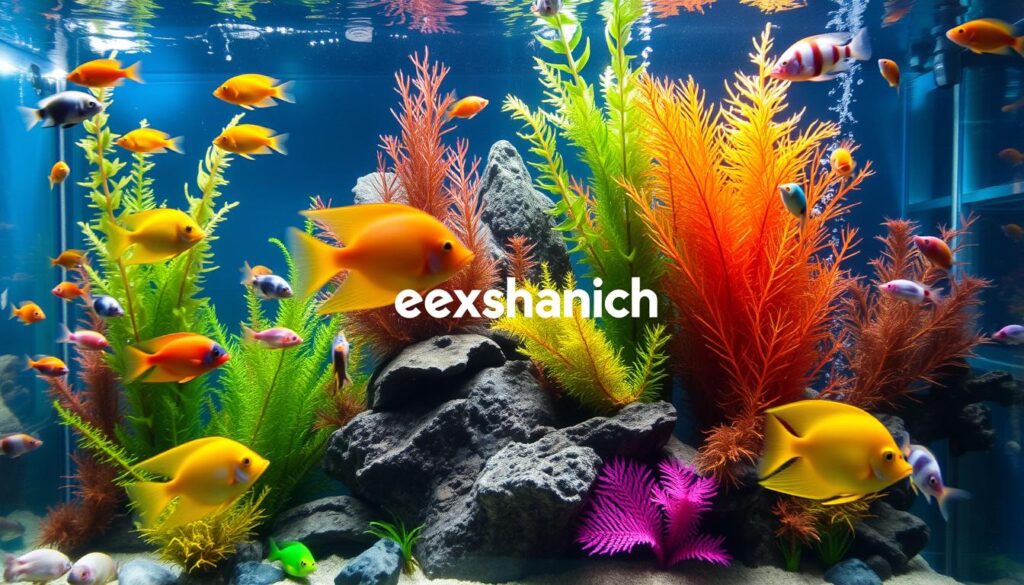
How Often Should You Feed Tropical Fish
Feeding tropical fish needs careful thought to keep them healthy and happy. Knowing how often to feed them depends on their species, size, and age. A regular feeding schedule helps them grow and stay well.
Recommended Feeding Frequency
Most tropical fish should be fed once or twice a day. This helps them get a balanced diet without upsetting their stomachs. Here’s a quick guide:
- Juvenile Fish: Feed them two to three times a day because they need more food for growth.
- Adult Fish: Once or twice a day is usually enough, depending on how active they are.
- Larger Fish: Big fish might only need to eat once a day, while smaller ones might need more often.
Factors Influencing Feeding Times
Several things affect how often to feed tropical fish:
- Water Temperature: Warmer water makes fish eat more because they burn energy faster.
- Activity Levels: Active fish might need more food to keep their energy up.
- Aging Fish: Older fish eat less because their metabolism slows down.
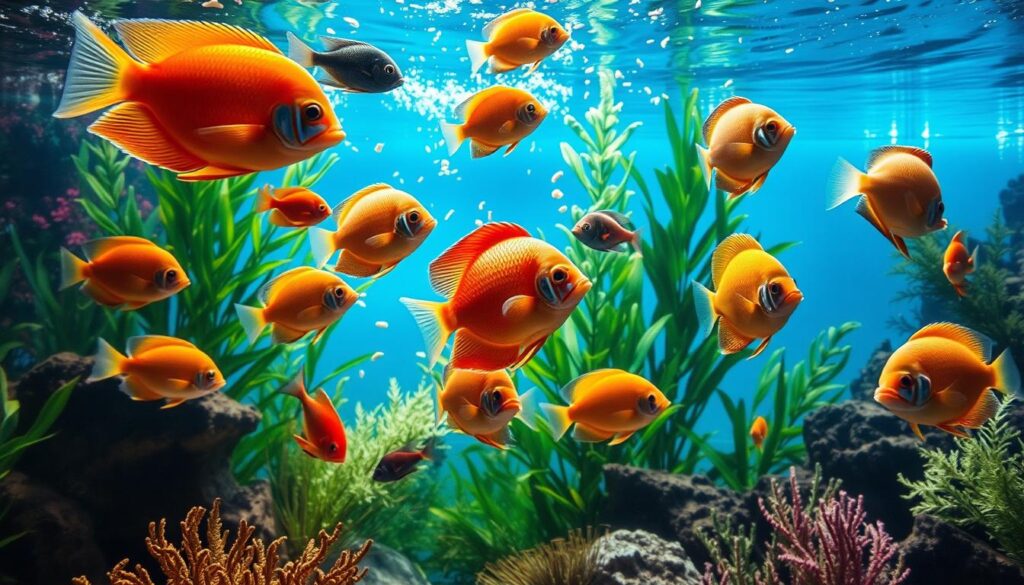
By knowing these factors, you can tailor your fish’s diet. Watching them and making changes helps keep your aquarium healthy. This way, your fish will be happy and healthy.
Types of Tropical Fish and Their Feeding Needs
Knowing what different tropical fish eat is key to good care. Each species has its own food needs. This means you must adjust their aquarium fish diet accordingly. Here are some examples of fish and what they like to eat.
Different Species, Different Requirements
Grouping tropical fish by their eating habits helps us understand their needs:
| Fish Species | Diet Type | Preferred Food |
|---|---|---|
| Betta Fish | Carnivorous | High-protein pellets, live or frozen food |
| Tetras | Omnivorous | Flake food, both plant and meat-based |
| Cichlids | Carnivorous and Omnivorous | Pellets, freeze-dried food, and vegetables |
| Goldfish | Herbivorous | Vegetable-based flakes and pellets |
Different fish have different needs that affect their health. Giving each the right food helps them grow and keeps the tank healthy. Paying attention to their aquarium fish diet can stop health problems and make them happier.
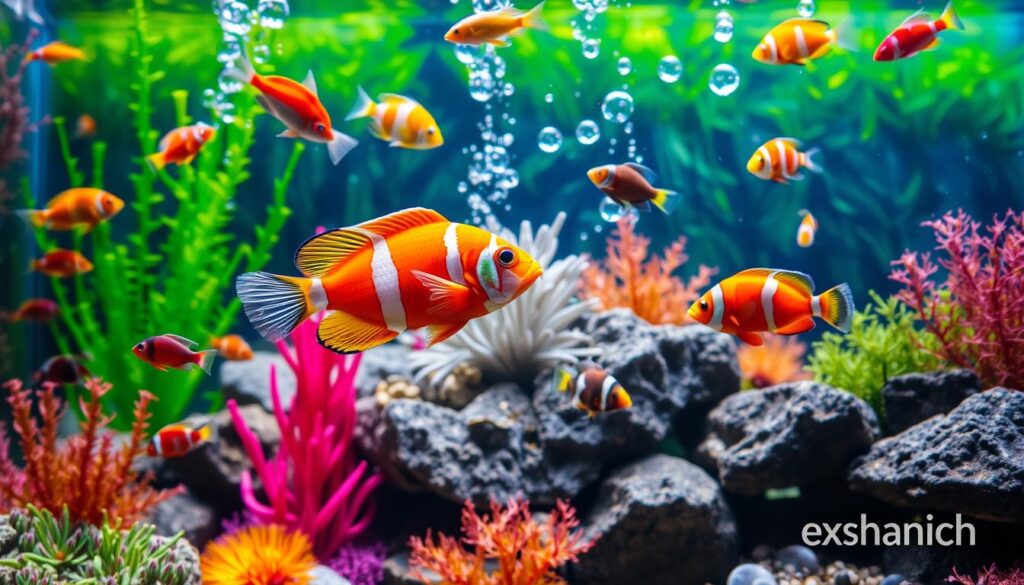
Signs of Overfeeding Fish
It’s crucial to watch your tropical fish closely, especially for signs of overfeeding. Overfeeding can cause health problems, affecting both your fish and the tank’s environment. Spotting these signs early helps keep your tank balanced and your fish healthy.
Physical Signs to Watch For
Fish show physical signs when they’re overfed. Spotting these signs quickly can stop bigger problems.
- Bloating: Fish may look swollen or too full, showing they’ve eaten too much.
- Lethargy: Overfed fish often move slowly, losing their usual energy.
- Unusual swimming patterns: They might swim oddly or have trouble staying upright.
- Excess waste: More waste means cloudy water and higher ammonia levels.
- Changes in appetite: Fish may lose interest in food, showing they’re not feeling well.
Knowing these signs helps you act fast to protect your fish and tank. Watching your fish closely and adjusting their food is important for a healthy aquarium.
| Signs | Potential Implications |
|---|---|
| Bloating | Shows they’ve eaten too much; might have internal problems |
| Lethargy | Less energy; could make them more likely to get sick |
| Unusual swimming patterns | May mean they’re stressed or uncomfortable |
| Excess waste | More ammonia in the water; could be toxic |
| Changes in appetite | Could mean digestive issues; might stay lethargic |
Signs of Underfeeding Fish
It’s important to watch your tropical fish for signs of underfeeding. Not feeding them enough can cause big problems. These problems can hurt their health, growth, and energy. By spotting signs of malnutrition early, you can help improve their diet.
Health Indicators in Tropical Fish
There are key signs to look for to see if your fish are getting enough to eat. Knowing these signs helps you act fast to fix any diet issues. Here are some things to watch for:
- Weight Loss: If your fish are losing weight, they might not be eating enough.
- Decreased Activity: If your fish seem tired or less active, they could be hungry.
- Poor Coloration: Healthy fish have bright colors. If they look dull, they might not be getting enough food.
- Fin Nipping: When fish fight over food, it can be a sign they’re not getting enough to eat.
- Hiding Behavior: If fish hide a lot, it could mean they’re stressed from not getting enough food.
Marine biologists know that underfeeding can harm fish health. They stress the need for a balanced diet to keep fish healthy and colorful. Catching these signs early can stop bigger health problems and keep your aquarium happy and healthy.
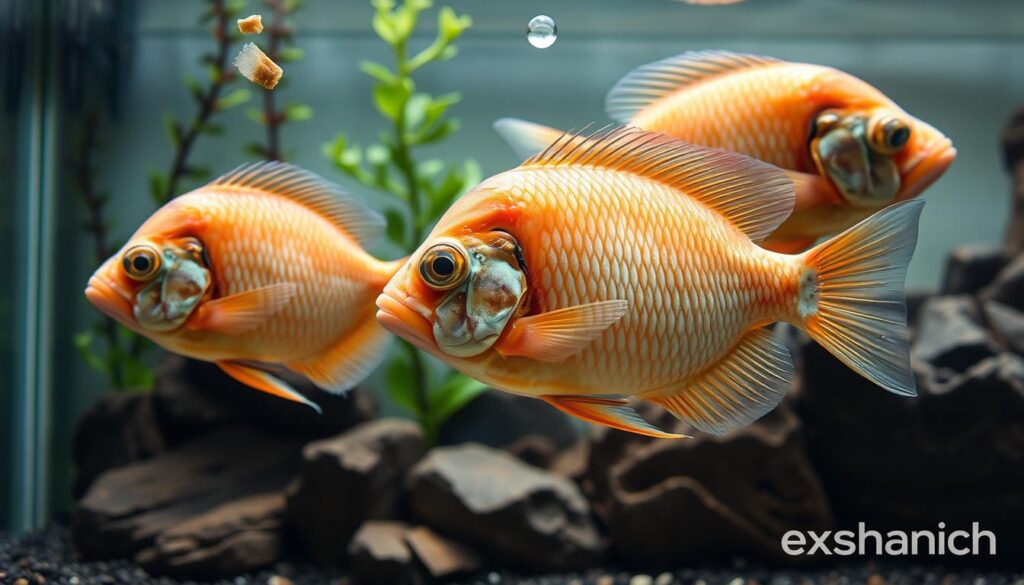
Best Practices for Fish Feeding
Creating a good fish feeding schedule is key to caring for tropical fish. By following a routine, you make sure fish get the right food. This keeps them healthy and the water clean.
Here are some tips to make your fish feeding better:
- Portion Control: Figure out how much food each fish needs. Fish usually eat all their food in 2-3 minutes.
- Timing: Feed at the same times every day. This helps the fish and lets you watch their behavior.
- Varying Diet: Mix up the food you give them. Use flakes, pellets, frozen, and freeze-dried foods for a balanced diet.
- Feeding Journal: Keep a record of what and how much you feed them. This helps you see patterns and make changes.
- Watch for Uneaten Food: Take out any food that’s left over. Left food can make the water dirty and harm the fish.
It’s important to watch your fish while they eat. If they start eating differently, it might mean they’re sick or stressed. Talking to other fish keepers can also give you good advice for your fish.
| Practice | Description |
|---|---|
| Portion Control | Feed only what fish can consume in 2-3 minutes. |
| Timing | Establish a consistent feeding routine daily. |
| Varying Diet | Incorporate a mix of food types for balanced nutrition. |
| Feeding Journal | Document feeding habits to spot trends and make adjustments. |
| Remove Uneaten Food | Ensure no leftover food remains to maintain water quality. |
Tropical Fish Care Beyond Feeding
Keeping tropical fish healthy is more than just feeding them. It’s about regular maintenance to keep their home clean. A clean tank is key to stopping diseases and keeping fish healthy.
Maintaining a Clean Aquarium
Keeping your tank clean is crucial for your fish’s health. Tasks like water changes, tank cleaning, and equipment checks are important. Here are some key tasks:
- Do water changes (at least 10-15% weekly) to keep water quality good.
- Clean algae from the tank walls for a clear view.
- Regularly check and clean the filtration system to keep it working well.
- Remove uneaten food and organic waste to stop decay and harmful bacteria.
- Check aquatic plants for decay and trim them as needed.

Keeping the tank clean helps create a stable home for your fish. This leads to better growth and color in tropical fish.
| Maintenance Task | Frequency | Purpose |
|---|---|---|
| Water Changes | Weekly | Maintains water quality |
| Tank Cleaning | Biweekly | Removes algae and debris |
| Filter Maintenance | Monthly | Ensures effective filtration |
| Plant Inspection | As needed | Prevents decay and promotes health |
Following these care practices builds a strong foundation for a healthy aquarium. Regular maintenance leads to a vibrant and lively home for your fish.
Fish Nutrition: What You Need to Know
Knowing about fish nutrition is key to keeping your aquarium healthy. A good diet for fish includes both big and small nutrients. This ensures they grow well and live happily in their home.
Protein is a must for fish. It helps them build muscles and fix tissues. You can find protein in fish meal, plants, and even insects. Fatty acids are also important. They give fish energy and keep their skin and fins healthy.
Vitamins and minerals are also vital. Vitamins boost the immune system, and minerals help with body functions. A balanced diet will include these, keeping your fish lively and well.
Choosing quality over quantity in fish food is important. Premium brands offer complete and balanced diets. This avoids the problems of cheap food that lacks important nutrients. Experts suggest mixing dry, frozen, and live foods to meet all tropical fish needs.
In short, knowing about fish nutrition is essential for aquarium owners. A balanced diet, focusing on quality, and offering a variety of foods will make your fish healthier and more active.
Creating a Balanced Fish Feeding Schedule
It’s key to have a regular fish feeding schedule for tropical fish health. A balanced feeding schedule makes sure fish get the right food. It also keeps the aquarium stable. Each fish species needs different food amounts and types.
First, figure out how often to feed your tropical fish. Most do well with two to three meals a day. But, don’t overfeed. Watch how your fish react and change feeding times if needed. Here are tips for a good feeding schedule:
- Observe Behavior: See how hungry your fish are and adjust food amounts.
- Environmental Factors: Keep an eye on water quality, temperature, and tank size.
- Species Consideration: Learn what each fish species needs to eat.
Using a checklist can help keep your fish feeding schedule on track. Here’s an example:
| Fish Species | Feeding Frequency | Recommended Food Type |
|---|---|---|
| Neon Tetra | 2-3 times/day | Flake food, finely crushed pellets |
| Oscar | 1-2 times/day | Carnivore pellets, live food |
| Betta | 2-3 times/day | Specialized betta pellets, freeze-dried foods |
Being flexible with your feeding plan helps adjust for fish behavior and health. A well-planned fish feeding schedule greatly improves your fish’s life quality.
Conclusion
Knowing how often to feed tropical fish is key to their health and happiness. A good feeding schedule helps avoid overfeeding and underfeeding. It makes sure your fish get the nutrients they need.
Different fish need different foods, and their needs can change as they grow or become more active. It’s important for fish owners to watch their fish closely and adjust feeding as needed.
By paying attention to your fish’s behavior and health, you can make better choices for them. Remember, taking care of tropical fish is more than just feeding them. A balanced diet is part of creating a healthy home for them.
By learning and adapting to care for your fish, you can create a lively underwater world at home. Your effort in learning and adjusting will make your experience with tropical fish rewarding for both you and your fish.

FAQ
How often should I feed my tropical fish?
It’s best to feed tropical fish once or twice a day. But, the type of fish and tank conditions can change this.
What happens if I overfeed my fish?
Overfeeding can cause health problems like bloating and lethargy. It also increases waste, harming the water quality and fish environment.
How can I tell if my fish are underfed?
Signs of underfeeding include weight loss and poor color. Watching your fish closely can help spot these issues.
Are different types of tropical fish fed in the same way?
No, each species has its own diet needs. For example, carnivorous fish need high-protein foods, while herbivorous fish prefer plant-based foods.
What’s the best way to decide on a fish feeding schedule?
Observe your fish and adjust feeding times based on their needs. Keeping a feeding journal can also help track their needs.
How can I prevent overfeeding in my aquarium?
Only give food that your fish can eat in a few minutes. Remove any leftover food to keep the water quality good.
Why is a consistent feeding schedule important for my fish?
A consistent schedule reduces stress and keeps water quality stable. This is good for your fish’s health and happiness.
What type of food should I provide for my tropical fish?
Choose high-quality food like flakes, pellets, and freeze-dried options. Make sure it meets your fish’s nutritional needs based on their diet.
How do I maintain my fish tank along with feeding?
Regular maintenance like water changes and tank cleaning is key. It keeps your fish healthy, along with proper feeding.
What are the indicators of good fish nutrition?
Healthy fish have vibrant colors and normal activity. A balanced diet is essential for these signs.





 No products in the cart.
No products in the cart.